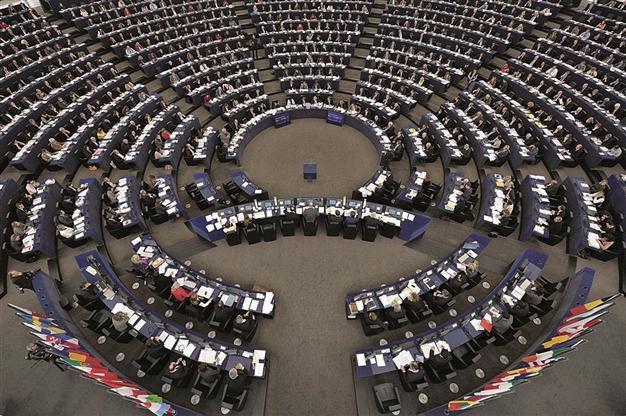EU Parliament rejects draft budget for $1.3 tln
BRUSSELS - The Associated Press

Members of the European Parliament take part in a voting session for 2014-2020 EU budget at the European Parliament in Strasbourg on March 13, 2013. AFP photo
The European Parliament has overwhelmingly rejected a proposal for the European Union’s 960 billion euros ($1.3 trillion) budget, in the latest example of the lawmakers’ newfound resolve to stand up to the bloc’s national leaders.“This is an important step for the European democracy,” said European Parliament President Martin Schulz on March 13 following the Parliament’s decision.
The seven-year plan - brokered at a summit of the 27 heads of state and government last month after two days of nearly round-the-clock negotiations - didn’t address Parliament’s main demands that more be spent to foster economic growth and that there be flexibility to move money within the budget. For that reason, Schulz said, it had to be rejected.
The leaders’ proposal involved spending cuts for the first time in the EU’s history and would cement the bloc’s budget through 2020.
“The vote has shown that the European Parliament must be taken seriously as a negotiating partner,” Schulz said. “We are now ready to negotiate a fair multi-annual budget,” he added.
Crucially, lawmakers are also looking to add a legally binding review clause that would allow them to reopen and readjust the budget after next year’s European Parliament elections. The governments loathe that idea, fearing it might be a backdoor to higher spending.
“We do not believe in a crisis budget for seven years,” insisted Joseph Daul, who leads the Parliament’s majority center-right caucus.
Government representatives and Parliament must now try to hammer out a compromise. Officials say they aim to finalize it before the summer.
The powers of the Parliament - the EU’s only directly elected institution - were greatly expanded by the EU’s 2009 Lisbon treaty, and the rejection marked the first time the Parliament has had the right to block the multi-annual budget. The European Parliament has started to flex its muscle under the leadership of the plain-spoken and assertive Schulz. And the EU’s 27 governments have already started to see a shift in the balance of power - as have the continent’s top banking executives. Earlier this month, in arduous negotiations, Parliament forced the member governments to accept a cap on bankers’ bonuses to the amount of their base salaries, or twice that if shareholders agree.
Parliament eyes stronger banking system
Lawmakers added the bonus caps to an important package of legislation strengthening the EU’s banking system. Eager to pass the package without further delay, the governments grudgingly accepted the Parliament’s proposal, despite strenuous opposition from Britain, home to the EU’s biggest financial industry.
The EU budget is separate from the national budgets of the member governments and is designed in part to balance out the economic development of the region by injecting funding into poorer countries. It includes significant funds for agricultural subsidies, but also for important infrastructure projects, research grants, diplomacy, and development aid around the world.
The national leaders’ budget proposal falls 40 billion euros short of the proposal first set forth by the European Commission.
On March 13, 506 of 690 lawmakers rejected the current budget proposal. If negotiations fail to yield a compromise before next year, the EU would have to operate under a provisional budget.
















